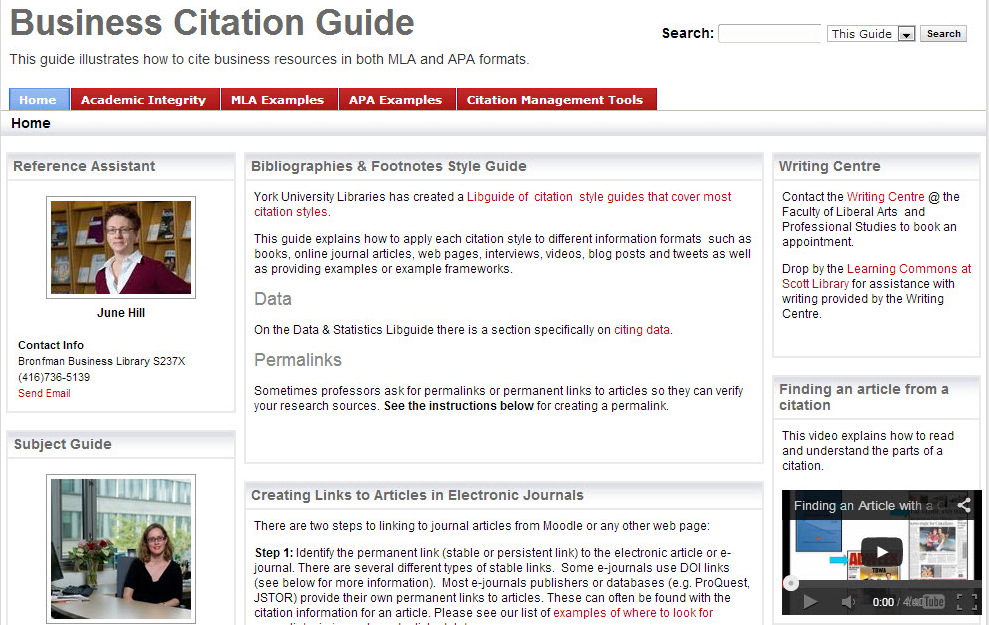Sophie Bury, Head & Business Librarian, Bronfman Business Library and
June Hill, Reference Assistant, Bronfman Business Library
Published Monday December 2nd, 2013
As it’s that time of year when deadlines for research papers/projects are looming, we thought it would be extremely timely to highlight the key features of our new business citation guide. After all, one of the tasks that business students are often perfecting in the final throes of deadline times is their in-text citations and their references list.
Of course, at York academic honesty is very important, and that’s very clear both from York’s Academic Integrity web site for students and from Schulich’s Academic Honesty Policy. Basically any time an idea is not your own, be it either something you paraphrase or quote directly, it’s critical to cite it. This gives credit, where credit is due, i.e. acknowledges the person or people who came up with the idea or finding, it strengthens your work/writing, and it’s a service to your reader, who will be more easily able to find the source referred to when reading your work.
Up until now the Business Library’s web site featured several different links to relevant sources on both academic integrity and citing. Things are much more cohesive now as we have used our Libguides software system to create a one-stop-shop, so to speak. Libguides allow you to organize key information in to easy-to-digest chunks by offering tabs and boxes, so that content is easily accessible and scannable in one spot, as this screen shot of our business citation guide below shows.
We strongly encourage you to check out our new business citation guide to learn about:
- Academic integrity fundamentals. This includes a set of slides, developed by one of our business librarians, Kim Stymest, who also works with Schulich Student Services each year to organize a workshop on academic integrity and citing for Schulich students. If you are a Schulich student keep your eye out for a Winter term announcement of this workshop on the Undergrad Blog and Grad Blog. Kim’s slides outline the basic what, why and how of academic integrity and citing in the world of business information and point to useful resources.
- The fundamentals of citing business information using APA or MLA citation styles. In our experience, these two styles are by far the most commonly requested for assignments in business programs at York. We took a leaf out of McGill library’s book in creating our APA guide and accordingly acknowledge this (unfortunately, though, the McGill folks have decided not to maintain their guide any more). The approach is similar with our MLA guide. What we liked so much about what the folks at McGill did was that they provided real examples from the many types of information sources a business student might typically need to cite for research projects, so it makes the task of citing more accessible and less abstract. Many business projects, e.g. business plan projects, market research reports, finance assignments require students to move well beyond books and journals, and to use and cite reports and data from a range of databases, e.g. company databases such as Mergent Online or Hoovers, market research databases, such as Marketline Advantage or GMID, or financial data sources such as Bloomberg or Datastream. For this reason, we’ve made sure our APA and MLA guides provide lots of examples of how to cite a range of specific business e-resources, as well as doing a good job of covering off the basics of how to cite books, e-books, articles and web sites. In addition, both our APA and MLA guides give you tips on how to cite information sources within the body of your research paper.
- The ins-and-outs of citation management tools supported by York University Libraries. In particular, the citation guide links to our Zotero guide and instructional video, and our RefWorks guide. These tools can save you a lot of time when researching by giving you the option to set up your own password-protected web-based database, where you can quickly and easily import and save your references from library catalogues, databases and web sites, working from your own desktop or laptop computer or using library computers. You can use these tools to organize, manage and annotate your citations, and to generate bibliographies in a huge number of different citation styles. Of course, the bibliographic information imported for each reference is only ever as good as the source it comes from, so it’s always wise to check things over by consulting an authoritative guide on the citation style you are using and our business citation guide can help you out.
Still got questions about how to cite your sources? There are many different ways to submit your research question to the Bronfman Business Library. You can email us at bronfref@yorku.ca, chat with us here, phone us at 416-736-5139 or drop by in person.

